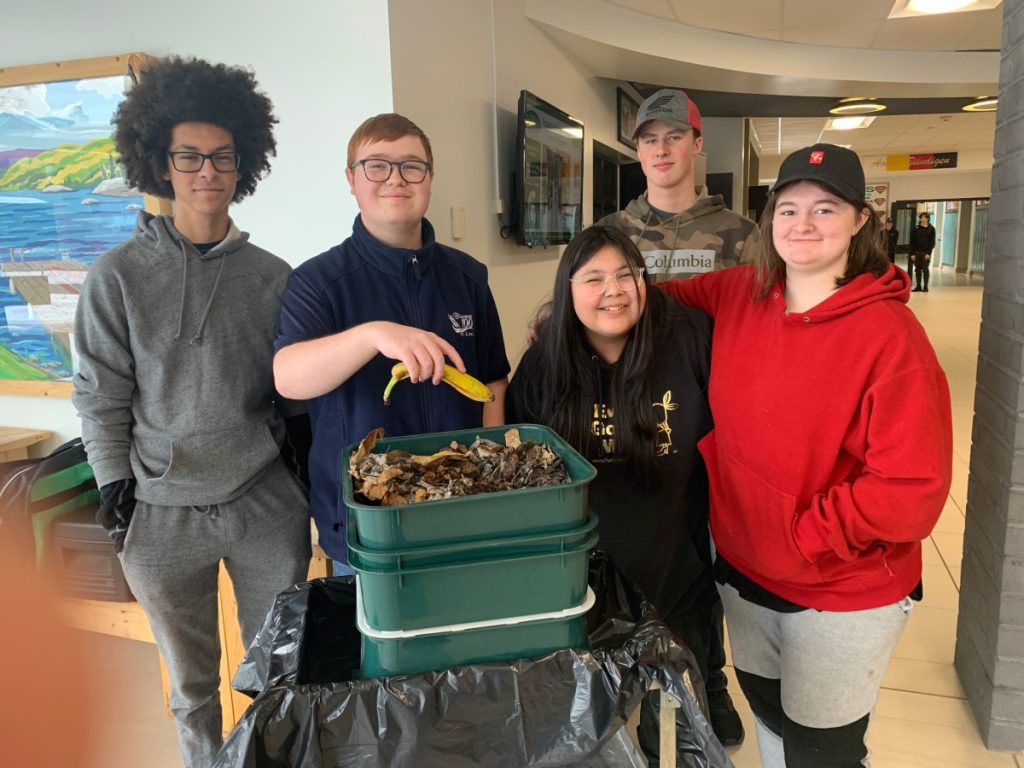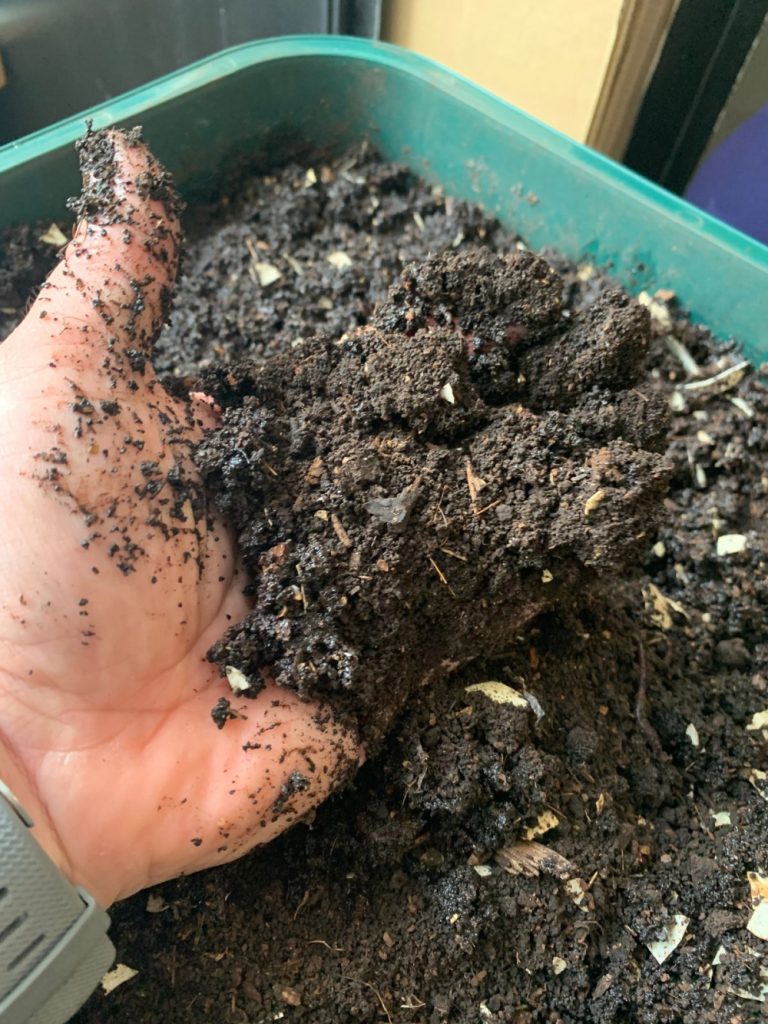Many school environmental clubs are composting or using red wigglers for indoor vermicomposting to build healthy soil for their nature/veggie gardens.
Northern Ontario’s Espanola High School (EHS) received a $500 grant in 2021 from Learning for a Sustainable Future (LSF) to extend its composting programs. In order to nurture the soil for its school’s two gardens, this funding was spent on a second “FoodCycler”—a medium size appliance that heats, dries, and grinds unwanted organic food into a crumb-like consistency referred to as “Foodilizer.” Unlike natural compost, it has no microbial or bacterial qualities, but when combined with compost, it increases the volume of natural fertilizer. In addition to the “FoodCycler,” the grant also allowed the purchase of a vermicomposter system with red wiggler worms becoming the new classroom residents.

Espanola High School Students
Art teacher and Eco School lead Jason Stewart stated, “We’re excited to marry the two techniques with the funding, and by the spring, we will have plenty of soil to use in the school’s gardens. This funding will help us divert all of our organic waste from the servery, food classes, cafeteria, breakfast club, staff offices, and classrooms and turn it into rich soil. Any leftover foods that contain meat, oils, and dairy have been separated and picked up by a pig farmer for animal feed.”
The school also received funding from local business Northern Phone Repair which enabled students to purchase soil and seeds to begin growing their own vegetables. Stewart added, “All our EHS teachers and staff engage in our school’s effort to focus on the beautiful land on which we are situated. Students are also becoming more responsible for diverting unwanted food into compost. Our nature and vegetable gardens were established six years ago in the school’s inner courtyard. Since that time, the familiar backyard composter, a greenhouse, and a water garden have been added. In this delightful space, teachers are able to offer outdoor classes.”
The EHS students proudly display their first Platinum Goal EcoSchool status and are working towards receiving the honour again with their extended composting programs.
Michelle Desbiens explained, “Being in this program helps others to understand ways to help the ecosystem. For example, they learn to use leftovers or even just table scraps to turn into compost which will then be added to their garden soil. This is an extremely valuable experience because it helps teach students new skills that they can use daily and maybe even teach their friends or family.”
Jack Hughson added, “One person’s trash is another person’s treasure. So if you treat waste, plastic, and compost as treasure, you will respect it and put it where it’s supposed to belong.”
The life skill learning process to care for the soil’s health is of utmost importance. A recent report entitled “Recruiting Soil to Tackle Climate Change: A Roadmap for Canada” by the Soil Conservation Council of Canada and the Compost Council of Canada (CCC) includes detailed science-based soil-health information and recommendations. It identifies that our soils have the potential to offset agriculture’s greenhouse gas emission footprint. Glenn Munroe, a co-author of the “Roadmap,” stated, “Soils can effectively store carbon. At the same time, they provide increased fertility, cleaner water, and enhanced biodiversity. For our farmers, they also create greater resiliency and profitability.”
As soil is the foundation of life, the CCC provides the following opportunities for carbon sequestration:
• Spread seeds on the soil surface and cover with compost. For seedlings, make a hole big enough for the roots and fill with compost.
• Protect bare soil and the underground workforce by utilizing mulches of straw, wood chips, or cardboard.
• Welcome diversity with different plants to attract and nurture different soil microbes.
• Include perennials and native plants in your school garden to feed microbes all year long, which helps to maintain diversity and overall soil health.
• Practice careful cultivation. Built-up soil is the foundation of life, and good soil tackles climate change by effectively storing carbon. Soils are living ecosystems teaming with beneficial organisms that support plant growth and health. This underground workforce, when left undisturbed, provides increased fertility, cleaner water, and enhanced biodiversity. To keep feeding the soil over the winter, leave annuals in place or cut off wilted flowers and weeds at the soil level.
Students may like to start sowing seeds in their classrooms. They can also experiment with re-sprouting existing plants. For instance, leave about an inch at the base of celery stocks, lettuce heads, or leeks and place them in an open jar with enough water to cover the base of the plant. Roots will begin to grow. Leave until the roots become a bit longer before transferring them into a pot of soil with compost. Water regularly. Before long, new plants will emerge.
 When preparing beets or carrots, cut off the tops and place in a flat dish of shallow water. The beet top will grow leaves, and carrots will sprout new green tops. Not much, I’ll admit, but it’s a little extra you can add to a garden salad.
When preparing beets or carrots, cut off the tops and place in a flat dish of shallow water. The beet top will grow leaves, and carrots will sprout new green tops. Not much, I’ll admit, but it’s a little extra you can add to a garden salad.
Compost tea is a blend of mature compost and water. To create a batch, place some mature compost into a cotton or burlap bag and suspend it in a barrel of water. Let it steep for two days. Stir frequently for aeration. Compost tea is loaded with soluble nutrients packed into living bacteria. The real credit belongs to the microscopic bacteria and microbes. When compost tea enters a plant’s roots or is absorbed by a leaf ’s surface, the bacteria arrive, live, reproduce, and die, releasing the nutrients to provide nourishment to a plant. The plant actually tells the population of microbes exactly what it wants chemically through its exudate—a secretion similar to sweat—so there is communication between the plant and the bacterial population.
Programs designed to encompass the restoration of our soils and the food-growing process should be integrated as part of formal educational experiences.
Related Links
https://discoverairdrie.com/articles/city-council-has- proclaimed-october-circular-economy-month-
https://www.honestlymodern.com/an-unpaid-review-of-the-foodcycler/
http://www.compost.org/wp-content/uploads/2022/04/SOIL-SAFARI-Climate-Smart-Gardening-PAGE-02.pdf
http://www.compost.org/wp-content/uploads/2022/04/SOIL-SAFARI-Climate-Smart-Gardening-PAGE-03.pdf
http://www.compost.org/wp-content/uploads/2022/04/SOIL-SAFARI-Climate-Smart-Gardening-PAGE-04.pdf
http://www.compost.org/wp-content/uploads/2022/04/SOIL-SAFARI-Climate-Smart-Gardening-PAGE-05.pdf
http://www.compost.org/wp-content/uploads/2022/04/SOIL-SAFARI-Climate-Smart-Gardening-PAGE-06.pdf
https://learn.eartheasy.com/articles/the-best-compost-tea-recipe-to-help-your-plants-thrive/
ABOUT THE AUTHOR
Larraine Roulston
Larraine writes children’s illustrated adventure books on composting and pollinating. To view, visit: castlecompost.com
This article is featured in Canadian Teacher Magazine’s Spring 2023 issue.












